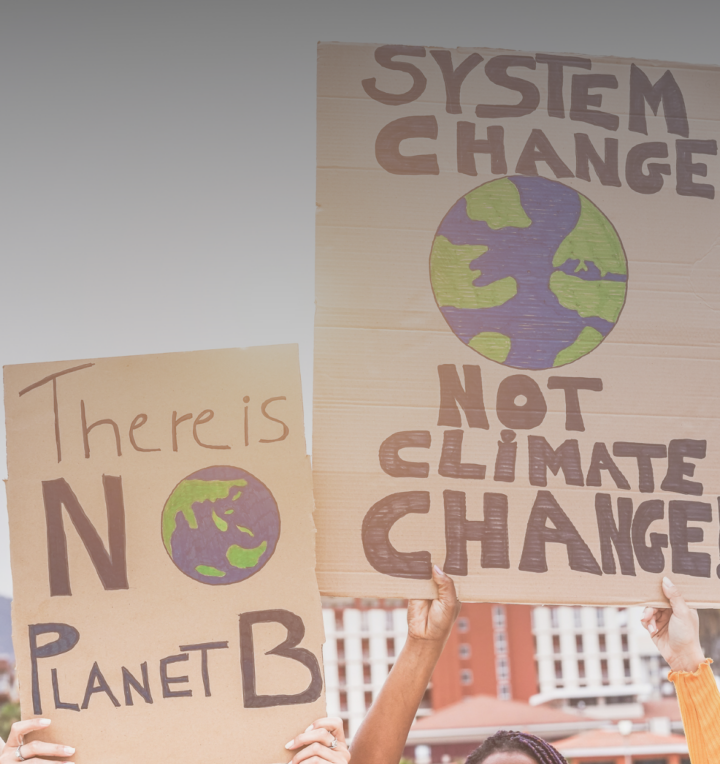Impact Capitalism in a Nutshell

The basic concept of Impact Capitalism
Our fundamental idea of impact capitalism is to transform our economic system in a way that the interests of people, planet and profits are fully aligned. Such alignment inherently ensures that the vast power of financial markets and entrepreneurial activity is effectively harnessed as contributing forces towards solving the big environmental and social challenges that humanity faces in the 21st century.
But what does that mean in practice?
Impact Capitalism means for example investing your money in a company whose products directly contribute towards solving the climate crisis. Let’s think of a renewable energy company that pays a market-rate annual dividend to its shareholders while its stock price keeps increasing. Such company has strong ESG-standards and runs its operations in a way that all of its stakeholders are benefiting. These include its employees, suppliers, customers, the community in which the company operates and even the planet. This company is an example for the aligned interest of people, planet and profits: The better the company does, the more benefit it delivers to people, planet and profits.
Financial Capitalism – in contrast – means to invest your money e.g. in a fossile fuel company simply because you expect good financial returns. You ignore that the company’s operations are worsening the climate crisis and that people of the global south are the first one’s suffering from these effects. For you to pursue your isolated interest in financial profit, both people and planet pay an ever-increasing price.
Why: Financial capitalism turned into a liability for humanity
Why do we need to transition away from our current system of financial capitalism? Because it has produced the outcomes that constitute the biggest challenges to humanity in the 21st century: The climate crisis/biodiversity collapse and the ever-increasing social inequality – both at global scale. So why has financial capitalism yielded these outcomes? Because the incentives in the system of financial capitalism are set to maximise financial returns while at the same exploiting all legally available opportunities to socialise the costs of achieving maximum financial returns. In other words: Financial capitalism is systematically encouraging a privatisation of financial profits at the expense of people and planet (also referred to as “externalities“). This system is not immoral, but it is amoral with regard to the outcomes it produces. Financial capitalism is blind for the ethical dimension of its consequences.
We practice this system in most parts of the world since the advent of the industrial age in the 18th century. Without a doubt it has brought humanity a ton of desirable progress in e.g. healthcare, technology and an overall increase of wealth. But what the Club of Rome already stated in 1972, we must now collectively come to realise: The system has reached its limits. There is no infinite growths on a finite planet with finite resources. Financial capitalism has eventually turned from an asset to a liability for humanity!
What: Impact Capitalism is based on three pillars
Our concept of Impact Capitalism is based on fundamental change in three dimensions:
- Ethics
- Technology
- Regulation
1. Ethics: Mindset & Behaviour
Only a different mindset will yield a different outcome! Therefore we first of all need to change our mindset. This is about adopting a wholistic idea of what makes a fulfilled life. It is also about expanding our individual and collective stakeholder landscape. This is true in many dimensions of life, society and economy but here are two practical examples:
- As a consumer, it is about making the “citizen shift”: Only choosing between the options offered is no longer sufficient. People should play an active and creative role in shaping what those options are. Let us overcome the idea that maximum personal fulfilment results from a maximum financial wealth turned into a maximum of materialist consumption. Instead we should realise that the biggest contributors to life in fulfilment and balance are different: It is meaningful personal relationships, mental health and the ability to pursue work that allows us to develop our talent in a challenging environment marked by a high degree of autonomy, guided by a higher purpose that we are intrinsically passionate about.
- As an investor, it is about overcoming the idea of shareholder-value, where the sole purpose of a company is defined as the maximisation of financial value to its equity shareholders. We need to replace shareholder-value with stakeholder-value and need to rethink the stakeholder-landscape. Such landscape must go beyond the shareholders and customers of a company so that it includes not only the personal and professional development of its employees but it also accepts responsibility for society and environment.
2. Technology for Good
Technology is neither good nor bad—it is the use to which we put it that makes the difference. The Tech for Good movement is about the idea of using technology to contribute towards achieving the UN Sustainable-Development-Goals. It is about achieving good outcomes for the economy overall and for individual well-being by focusing technology on innovation-led growth rather than purely on labor reduction and cost savings through automation.
Today, frontier technologies such as the Internet of Things, smart robotics, process automation, new materials, artificial intelligence (AI), renewable energy and alternative nutrition are boosting productivity, raising prosperity and replacing mundane or dangerous tasks. But technologies may also have perverse effects that require us to take regulatory preventive or counteraction, such as AI being used unethically to manipulate people’s decision-making.
Technology has the potential to do good for people and planet across a wide range of domains. It can for example reduce greenhouse gas emissions through energy efficiency, renewable energy sources, and battery and control technologies for balancing supply and demand. Electric utilities could use smart grid technology to improve system efficiency by 12 to 21 percent, or $310 billion to $540 billion, between 2015 and 2035. AI and IoT help reduce energy consumption through automated management of operations; for example, DeepMind helped reduce the cooling bill at Google’s data centers by up to 40 percent. Smart building technologies can optimize energy consumption and monitor indoor air quality for improved physical well-being. The circular economy’s new services and business models, which are largely facilitated by digital platforms, could unleash as much as € 1.8 trillion of annual benefit, or a 7 percent additional GDP increase relative to the current development scenario in Europe alone by 2030.
3. Regulation: Frameworks & Taxonomy
Political institutions, parties and initiatives are an important part of achieving the necessary systemic transformation. Especially entrepreneurs and investors need to acknowledge the importance of taking a clear political stance, rather than just focussing on the financial prosperity of their business interest.
Regarding frameworks, we need to change the way we judge success on an individual and collective level. Again, this is true in many dimensions. Most urgently it must be changed for the way we judge business success: Today, indicators such as revenue, EBIT, growth-rates and discounted-cash-flows are key determinants for capital markets to assess the value a company. While looking at these factors, capital markets are ignoring the externalities that the operations of a business are causing. Capital markets are blind for the harm that a company does to society and environment in its constant attempt to optimise the above-mentioned financial indicators. This shows how the incentives in the current system are set in a way that they produce non-sustainable outcomes. This is the root-cause that we need to tackle. We therefore need to build new indicators into our existing frameworks to judge business success. Think of augmenting the US-GAAP so that it includes the externalities of a company, as suggested by a recent paper from Harvard Business School. Think of introducing new indicators like e.g. the average g of carbon emission that the fleet of an automotive OEM produces per km driven.
Regarding taxonomy, the urgent and most important key to setting incentives in order to achieve an environmentally sustainable economy is to put effective taxonomy in place for carbon emissions. Effective means in the range of $ 100 – 150 per t for developed countries. Such taxonomy must apply to all sectors and replace the current system of exemptions that is still allowed for by e.g. the European Emissions Trading System.
How: Transformation instead of Revolution
How do we establish a new economic order that works for people and planet for the centuries to come? We do not advocate a disruptive or revolutionary approach, but we advocate a fast and determined transformation from the current model of financial capitalism towards impact capitalism. It shall take place in a way that we consciously preserve those elements of financial capitalism which are aligned with the goal of finding a sustainable modus operandi for all of humanity. Sustainable not only in an ecological dimension, but in the true and broad meaning of the word: Can we keep doing this forever? If the answer is Yes, it’s sustainable. If the answer is No, it’s not and we have a problem begging for a solution. This holds true both on an individual and on a collective level. Let’s think of this transformation as an agile process consisting of incremental steps and potential re-adjustments along the way. The process needs contribution from centralized (governments, central banks, corporate CEOs) as well as from decentralized stakeholders (entrepreneurs, researchers, citizens, projects).
Why now: The 2020’s are the critical decade
Over the past decade, the scientific mainstream and the vast majority of our societies acknowledged the man-made nature of the climate crisis and biodiversity collapse. At the same time, we witnessed the widespread erosion of our “contrat social” in the western world, accompanied by the rise of political populism, fake-news and distrust in authorities. The presidency of Donald Trump intentionally drove the decline of international cooperation and ended with infamously provoked riots on Capitol Hill.
The 2020’s decade is the critical one to put in place the change that humanity desperately needs to regain control over the climate crisis. And we urgently need to offer a systemic alternative to financial capitalism on a political and economic level in order to re-unite our societies and uphold our values of free and liberal democracy.
The good news is: With the election of Joe Biden & Kamala Harris we see a decisive shift towards social justice and environmental sustainability in the White House. The Green New Deal of President von der Leyen starts making impact in the European Union and may inspire other political leaders across the globe. Those companies who have not yet intrinsically shifted towards more circular and sustainable products and supply chains are gradually forced to do so by a dramatic shift in their customer’s buying behaviour.
Now that all facts are on the table, the 2020’s are the time for us take individual and collective action towards establishing Impact Capitalism as the the new and holistically sustainable operating system for our societies and economies in the 21st century and beyond.
Advance Impact Capitalism by taking action
- Reflect on your own habits of consumption and adopt a growths-mindset
- Invest your money at the intersection of financial profits and environmental/social impact
- Support political actors that back the required regulation and taxonomy
- Spread the word about Impact Capitalism in your community and peer-group











